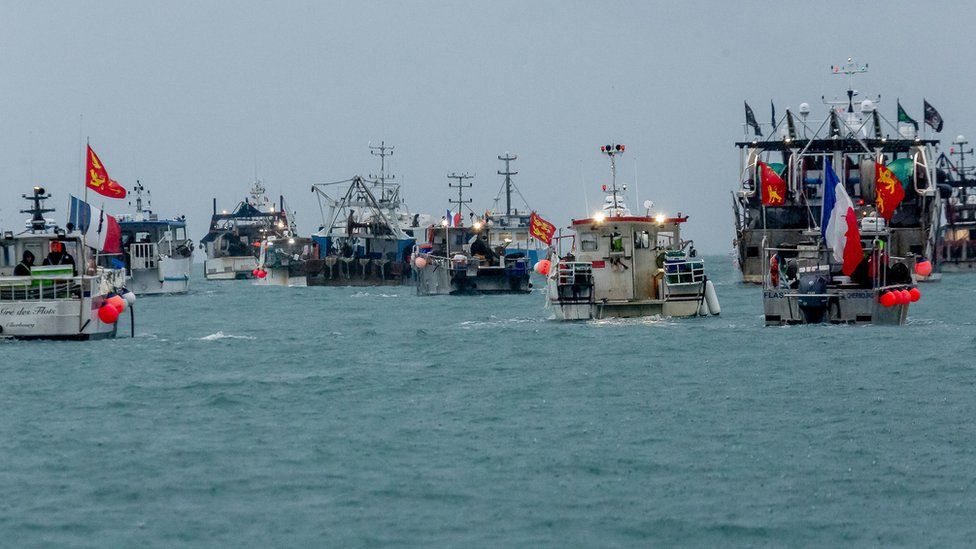A French minister says the boat did not have a licence to fish in French waters and was seized.

Image source, PA Media
A British trawler has been seized by France and another has been given a verbal warning, amid an escalating row over post-Brexit fishing rights.
French maritime minister Annick Girardin said the ships were cautioned during checks off Le Havre overnight.
She said the first did not comply right away and the second was not allowed to fish in French waters so was detained.
On Wednesday, Brexit Minister Lord Frost said French threats to block UK boats from ports were “disappointing”.
Ms Girardin said on Twitter one of the British trawlers was caught fishing in the Bay of Seine without the proper licences.
She said the boat was diverted to the port of Le Havre and detained by the judicial authority, where their catch could be confiscated and the boat held until a deposit is paid.
The boat’s captain also risks penal sanctions.
Meanwhile, the other boat was cautioned for initially resisting the check, Ms Girardin added.
The minister said checks on the British vessels were standard during the scallop fishing season.
But she added they had also been undertaken against “the backdrop of the tightening of controls in the Channel, in the context of discussions on licenses with the United Kingdom and the European Commission”.
France had warned that it would block British boats from some ports next week – as well as tightening checks on UK boats and trucks – if a post-Brexit dispute over fishing licences was not resolved by 2 November.
The UK said threats by France were “disproportionate” and a breach of international law and trade agreements.
Speaking before the latest development, Lord Frost said the government was seeking “urgent clarification” of France’s plans and would “consider what further action is necessary in that light”.
France was angered by a decision from the UK and Jersey last month to deny fishing licences to dozens of French boats, and argued that it breached the Brexit deal.
On Wednesday evening, it issued its ultimatum, saying it would begin to impose “targeted measures” from Tuesday of next week, including:
- Preventing British fishing boats from disembarking at ports
- Increasing border and sanitary checks on UK goods
- Tightening security checks on British boats
- Increasing checks on trucks going to and from the UK
France said it was also preparing further sanctions, which could include cutting electricity supplies to Jersey, a British Crown dependency, as it previously threatened in May.
“The French state will continue to support its fisheries industry,” the government said, adding that it expects answers from the UK “in the next few days”.
In a statement, Lord Frost said: “It is very disappointing that France has felt it necessary to make threats late this evening against the UK fishing industry and seemingly traders more broadly.
“As we have had no formal communication from the French government on this matter we will be seeking urgent clarification of their plans. We will consider what further action is necessary in that light.”


Fishing was one of the final sticking points in the post-Brexit trade talks.
While fishing is a tiny part of the economy on both sides of the Channel, it carries big political weight.
Regaining control over UK waters was a key part of the Leave campaign in 2016.
Under the UK/EU fishing deal, EU boats would continue to fish in UK waters, but UK fishing boats would get a greater share of fish caught in UK waters.
That shift in the share will be phased in between 2021 and 2026, with most of the quota transferred in 2021.
After that, there’ll be annual negotiations to decide how the catch is shared out between the UK and EU.
The UK would have the right to completely exclude EU boats after 2026.
But the EU could respond with taxes on exports of British fish to the EU or by denying UK boats access to EU waters.
In May, French trawlers protested outside the port of St Helier in Jersey, a British Crown dependency, in a dispute over access to its waters.
You can read more here.

Downing Street said on Wednesday the “disappointing and disproportionate” threat of sanctions was “not what we would expect from a close ally and partner”.
“The measures being threatened do not appear to be compatible with the Trade and Co-operation Agreement and wider international law, and, if carried through, will be met with an appropriate and calibrated response,” a spokeswoman said.
She said that the UK will raise concerns with both the EU and French government, arguing that it had granted 98% of licence applications from European boats.
The UK maintains the rejected applications which sparked the row did not have enough supporting evidence to show they had a history of fishing in Britain’s or Jersey’s waters.

